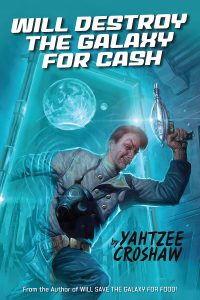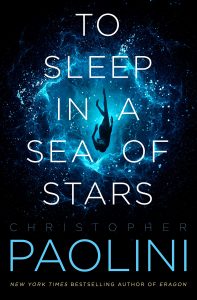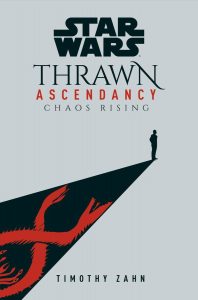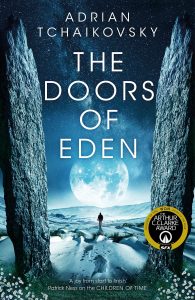Filip’s Five Favourite Sci-Fi Novels of 2020
Happy Tuesday, everyone! I’ve got another video for you all, in which I talk about my favourite science-fiction reads of the past year. You can’t go wrong with reading any one of these novels!
In case you prefer text to video, here are the highlighted discussions of each book–sans all the visual jokes and my horrifying, sentient hair. Some of these texts are adaptations of older reviews in part–I’ve added the links to those reviews, as well, in case your curiosity is piqued.
Will Destroy the Galaxy for Cash by Yahtzee Croshaw
 I’m a big fan of Yahtzee Croshaw. The risqué jokes, the cute little sprites, the cutting critiques—there’s plenty to admire in the mind behind Zero Punctuation and Slightly Civil War.
I’m a big fan of Yahtzee Croshaw. The risqué jokes, the cute little sprites, the cutting critiques—there’s plenty to admire in the mind behind Zero Punctuation and Slightly Civil War.
But Yahtzee isn’t just a razor-sharp critic; he’s also a very fine author of comedic sci-fi and This book was originally published on Audible in 2019, but came out in paperback in June 2020, so I’m stretching my own rules a little by adding it. It’s fine though, Will Destroy the Galaxy for Cash deserves it due to the hours of raucous laughter it imposed on me. This novel picks up with an the same unfortunate starship pilot in an age of quantum tunneling that you might know from the previous book in the series, Will Save the Galaxy for Food. Our protagonist is once more trying to make his way through the universe with nothing but his admittedly rather average wits, when he is embroiled in a heist, turns supervillain, and unleashes a host of evils onto known space.
For all the taking the piss where old space adventures are concerned, this one offers so much heart, such a charming and idiotic cast of heroes, villains and spades of idiots in between—it might not be the best sci-fi I read in 2020, but this is certainly the most fun I had with sci-fi.
Seven Devils by Laura Lem and Elizabeth May
 Empire is bloody business, and the Tholosian Empire is bloody even by the criterions used to judge similar galactic empires across the vast expanses of sci-fi. Violence, torture, and death are but a few of the more pronounced methods the Tholosian Emperor uses to maintain his galaxy-spanning influence. Far more subtle is the influence of the Oracle and of One, an AI always present in the thoughts of the empire’s populace, whispering commands in times of turmoil and putting all doubts and thoughts of disloyalty to sleep.
Empire is bloody business, and the Tholosian Empire is bloody even by the criterions used to judge similar galactic empires across the vast expanses of sci-fi. Violence, torture, and death are but a few of the more pronounced methods the Tholosian Emperor uses to maintain his galaxy-spanning influence. Far more subtle is the influence of the Oracle and of One, an AI always present in the thoughts of the empire’s populace, whispering commands in times of turmoil and putting all doubts and thoughts of disloyalty to sleep.
I should mention the characters—our protagonists are an excellent lot, their names drawn chiefly from Greek and Roman mythology, adding a delightful layer of intertextuality. Our main cast consists of: Eris, formerly Discordia, the disillusioned heiress of the Tholosian throne, now turned rebel; Cloelia, a mechanic and engineer for the Novantaen Resistance who knows Eris’s secret; Nyx, one of the Tholosian Empire’s most proficient and deadly killers, tired of all the blood on her hands; Rhea, a courtesan with a secret; and Ariadne, a prodigy who shares a special connection with the Oracle.
The one issue I have with the novel is a rather predictable plot twist I won’t speak about as to not spoil the climax; my problem with this revelation is, I saw it coming and a certain character or two should have, too. Apologies for keeping this so vague, but I want to keep this list as spoiler-free as possible.
You can find my review of Seven Devils here.
 To Sleep in A Sea of Stars by Christopher Paolini is the epitome of a cool character-driven space opera. It might not be the kind of science fiction that’ll expand your horizons or shock you with a stark new vision of humanity’s tomorrow, but it offers the thrills and joys characteristic to the very best examples of the subgenre. This might just be the perfect read for anyone inexperienced with space opera—though I finished this mammoth of a book, I am hungry for more; more of the action, camaraderie, and mystery that works such as this can offer. Knowing how many people loved the Inheritance Cycle, I suspect that some fantasy fans of the Inheritance Cycle who don’t normally have much interest in all things space-faring might be won over by Paolini; this might be a gateway to an entire new genre for those lucky readers!
To Sleep in A Sea of Stars by Christopher Paolini is the epitome of a cool character-driven space opera. It might not be the kind of science fiction that’ll expand your horizons or shock you with a stark new vision of humanity’s tomorrow, but it offers the thrills and joys characteristic to the very best examples of the subgenre. This might just be the perfect read for anyone inexperienced with space opera—though I finished this mammoth of a book, I am hungry for more; more of the action, camaraderie, and mystery that works such as this can offer. Knowing how many people loved the Inheritance Cycle, I suspect that some fantasy fans of the Inheritance Cycle who don’t normally have much interest in all things space-faring might be won over by Paolini; this might be a gateway to an entire new genre for those lucky readers!
You can find the full review here.
Chaos Rising (Star Wars: Thrawn Ascendancy #1) by Timothy Zahn
 Timothy Zahn’s writing has a very special place in my heart—his Thrawn trilogy informed my love for science fiction before any other. Zahn’s signature bestselling trilogy showed how potent the Star Wars universe is outside the medium of live action, it revitalized the franchise and it struck a creative spark that might have even helped George Lucas return to the universe and make his prequel trilogy.
Timothy Zahn’s writing has a very special place in my heart—his Thrawn trilogy informed my love for science fiction before any other. Zahn’s signature bestselling trilogy showed how potent the Star Wars universe is outside the medium of live action, it revitalized the franchise and it struck a creative spark that might have even helped George Lucas return to the universe and make his prequel trilogy.
After Disney’s purchase, I was far more excited about the news of Zahn writing more Thrawn books and introducing the blue-skinned admiral than I was about the sequel trilogy. I wasn’t disappointed, for the most part—though the trio of new Thrawn novels that came out between 2017 and 2019 weren’t a true trilogy but an interconnected series of standalones, I found all three of them engaging, to a greater or lesser extent.
Finally, we come to 2020—when Zahn has been contracted to develop a proper trilogy that reveals our would-be Grand Admiral’s humble beginnings in the Chiss Ascendancy. This book is and isn’t Star Wars. It captures so much of what I love about the universe—the spectacle, the compelling characters and interpersonal drama, the stakes. More importantly, Zahn knows how to write a compelling main character in Thrawn, even if he’s an atypical protagonist, his logical, orderly mind never shown us directly; rather, we follow his travails through a series of well-written characters, one of them returning from an earlier Zahn novel, but the others brand new.
This first book shows Thrawn as he’s never been portrayed before, among his fellow chiss, with a great deal of internal support in the military and many political foes afraid his unique skillset and viewpoint threaten the very fabric of Chiss society. This society, how it’s structured, its military and socio-political beliefs mark this novel out as different from so many of the Star Wars works that have come before.
But the conflicts that Chaos Rising follows are not only internal Chiss ones—this novel has a compelling and dangerous foe against whom Thrawn faces off—General Yiv the Benevolent, an altogether vicious fellow.
This is a very fine novel, perhaps my favourite release to come out since Disney’s acquisition of Lucasfilm.
You can find my review of Chaos Rising here.
The Doors of Eden by Adrian Tchaikovsky:
 Adrian Tchaikovsky is known as the author who can make you feel things about things when you least expect it. cry over spiders—and not just because you’re afraid they’ll eat your face. He’s written about dogs enhanced by weaponised technology, . Now, I don’t know how The Doors of Eden measures up to the rest of his novels, as it is my first Tchaikovsky work A common thread that many of his works share seems to be that they defy expectations by exploring the human condition in ways that’ll hit you like a truck!
Adrian Tchaikovsky is known as the author who can make you feel things about things when you least expect it. cry over spiders—and not just because you’re afraid they’ll eat your face. He’s written about dogs enhanced by weaponised technology, . Now, I don’t know how The Doors of Eden measures up to the rest of his novels, as it is my first Tchaikovsky work A common thread that many of his works share seems to be that they defy expectations by exploring the human condition in ways that’ll hit you like a truck!
I couldn’t possibly begin to tell you what the Doors of Eden does right, because that would take hours; what I can tell you with a great degree of certainty is, it is my favourite science-fiction novel of 2020, and the epitome of the new subgenre Peter F. Hamilton called “evolutionary SF”. It’s not a small novel, and it’s dense with fascinating concepts. This is science fiction at its best, chock-full of gripping ideas which’ll make you think and dream and imagine new worlds and alternate dimensions. It will inspire you to deconstruct and analyse its pages in search of deeper understanding and insight.
You can find my full review of The Doors of Eden here.

Seven Devils was a lot of fun, and To Sleep in A Sea of Stars is still on my TBR. I’ve been hesitant about the new Thrawn trilogy because I’m not generally a fan of prequels, but he’s such a great character, and I have such love for Zahn’s original Thrawn trilogy that I’m curious to give it a read.